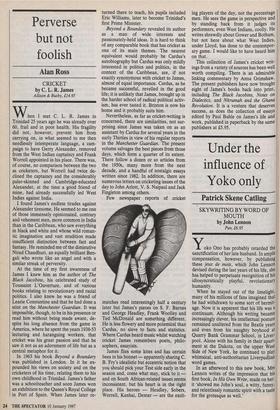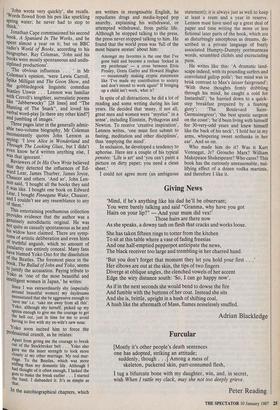Under the influence of Yoko only
Patrick Skene Catling
SKYWRITING BY WORD OF MOUTH by John Lennon
Pan, £6.95
Yoko Ono has probably retarded the sanctification of her late husband. In ample compensation, however, by publishing these jeux de mots, which John Lennon devised during the last years of his life, she has helped to perpetuate recognition of his idiosyncratically playful, revolutionary humanity.
When he stayed out of the limelight, many of his millions of fans imagined that he had withdrawn to some sort of hermit- age. Now it is apparent that his life was a continuum. Although his writing became increasingly clever, his intellectual posture remained unaltered from the Beatle years and even from his naughty boyhood at Quarry Bank Grammar School, in Liver- pool. Alone with his family in their apart- ment at the Dakota, on the upper West Side of New York, he continued to plaY whimsical, anti-authoritarian Liverpudlian word games.
In an afterword to this new book, Mrs Lennon writes of the impression that his first book, In His Own Write, made on her: it 'showed me John's soul, a witty, funny, and relentlessly romantic spirit with a taste for the grotesque as well.'
'John wrote very quickly', she recalls. 'Words flowed from his pen like sparkling Spring water; he never had to stop to think.'
Jonathan Cape commissioned his second book, A Spaniard In The Works, and he Spent almost a year on it; but on BBC radio's World of Books, according to his biographer, Ray Coleman, 'John said his books were mostly spontaneous and undis- ciplined productions'. 'The obvious influences . . . ' in Mr Coleman's opinion, 'were Lewis Carroll, Spike Milligan and The Goon Show, and the gobbledegook linguistic comedian Stanley Unwin . . . Lennon was familiar With Carroll's lengthier, surrealistic poems hke "Jabberwocky" [28 lines] and "The Hunting of The Snark", and loved his verbal word-play [is there any other kind?] and jumbling of images.' Three pages later in the generally admir- able two-volume biography, Mr Coleman Inconsistently quotes John Lennon as saying: 'I love Alice in Wonderland and Through The Looking Glass, but I didn't even know he'd written anything else, I was that ignorant.' Reviewers of In His Own Write believed that they detected the influences of Ed- ward Lear, James Thurber, James Joyce, Chaucer and others. 'And so', John Len- '?On said, 'I bought all the books they said It was like. I bought one book on Edward Lear, I bought Finnegans Wake, Chaucer,
and I couldn't see any resemblance to any of them,'
This entertaining posthumous collection provides evidence that the author was a genuinely autodidactic original. He was no. t quite as casually spontaneous as he and his widow have claimed. There are symp- toms of artistic deliberation and even hints truthful anguish, which no amount of Jocularity can entirely conceal. Many fans have blamed Yoko Ono for the dissolution of the Beatles. The foremost piece in the book, The Ballad of John and Yoko, seems to Justify the accusation. Paying tribute to Yoko as 'one of the most beautiful and Intelligent women in Japan,' he writes:
Since I was extraordinarily shy (especially around beautiful women) my daydreams necessitated that she be aggressive enough to save me' i.e. 'take me away from all this'. Yoko, although shy herself, picked up my Spirits enough to give me the courage to get the hell out, just in time for me to avoid having to live with my ex-wife's new nose.
Yoko soon incited him to force the Professional crunch, as he relates:
Apart from giving me the courage to break out of the Stockbroker belt . . Yoko also gave me the inner strength to look more Closely at my other marriage. My real mar- riage. To the Beatles, which was more Stifling than my domestic life. Although I had thought of it often enough, I lacked the guts to make the break earlier . . . I started the band. I disbanded it. It's as simple as that.
In the autobiographical chapters, which are written in recognisable English, he repudiates drugs and media-hyped pop anarchy, explaining his withdrawal, or attempted withdrawal, from public life. Although he stopped talking to the press, the press never stopped talking to him. He found that the world press was 'full of the most bizarre stories' about him:
Amongst my favorites is the one that I've gone bald and become a recluse 'locked in my penthouse' — a cross between Elvis Presley, Greta Garbo and Howard Hughes — occasionally making cryptic statements like 'I've made my contribution to society and don't intend to work again!' If bringing up a child isn't work, what is?
In spite of all distractions, he did a lot of reading and some writing during his last years. He decided that 'many, if not all, great men and women were "mystics" in a sense', including Einstein, Pythagoras and Newton. To receive 'creative inspiration', Lennon writes, 'one must first submit to fasting, meditation and other disciplines', thus 'emptying the mind'.
In seclusion, he developed a tendency to aphorise. Here are a couple of his typical pensees: 'Life is art' and 'you can't paint a picture on dirty paper; you need a clean sheet.'
I could not agree more (an ambiguous
statement); it is always just as well to keep at least a ream and a year in reserve. Lennon must have used up a great deal of paper and time writing the more or less fictional later parts of the book, which are as disturbingly amorphous as dreams, de- scribed in a private language of freely associated Humpty-Dumpty portmanteau words, scrambled clichés and excruciating puns.
He writes like this: 'A dramatic land- scape indeed, with its pounding surfers and convoluted gallop polls'; 'her mind was in brisk contrast to Max's laisser fairground'; 'With these thoughts firmly dribbling through his mind, he caught a cold for Instanbull'; 'he hurried down to a quick- step breakfast prepared by a fauning glory'; 'The Boulevard Saint- Germainegreer'; 'the best spastic surgeon on the coast'; 'he'd been living with himself for 30-very-odd years and knew himself like the back of his neck'; 'I hold her in my arms, whispering sweet nothanks in her ear'. And so on.
Who made him do it? Was it Kurt Vonnegut, Jr? Groucho Marx? William Makepeace Shakespeare? Who cares? This book has the curiously unreasonable, nul- lifying effect of a dozen vodka martinis, and therefore I like it.











































 Previous page
Previous page